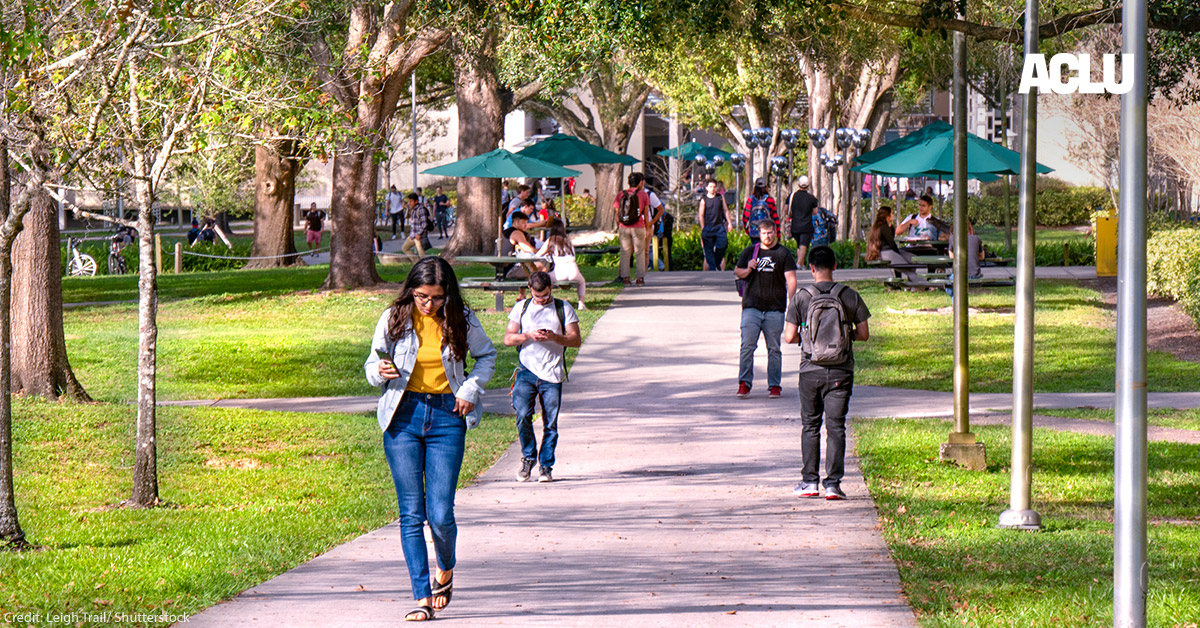
While studying abroad a couple of years ago, I heard first-hand accounts from Jordanian-Palestinian friends about the displacement their families, and families like theirs, experienced during the 1948 Nakba (Arabic for “catastrophe”). Moved by the painful memories they shared, I started researching student organizations advocating for Palestinian rights, and came across the Instagram of the University of Florida (UF) chapter of Students for Justice in Palestine (SJP). When I enrolled at UF a few months later, I immediately joined.
As a member of UF SJP, it was devastating when top Florida officials ordered public universities to deactivate all SJP chapters in the state, including ours. I remember being in shock when I read the order. Officials justified deactivating our chapter not because of anything our group had said or done—but because of our affiliation with the national chapter of Students for Justice in Palestine, a separate group. According to the order, certain views expressed in an advocacy toolkit the National SJP issued on October 7 violated Florida’s “material support of terrorism” law. But my student group was not even involved with the creation of that toolkit, which itself is protected by the First Amendment.
On October 8, our SJP chapter issued its own statement, saying that we “mourned the loss of innocent Palestinian and Israeli life,” and made clear that “the killing of any life is always undignified and heartbreaking.” Later, we issued another statement urging the University of Florida to condemn all violence, antisemitism, Islamophobia, Palestinian erasure, and anti-Palestinian sentiment.
Our chapter has students from a variety of religious, racial, and cultural backgrounds, including members who are Jewish, Palestinian, and Palestinian-American, who believe that speaking up for Palestine is speaking up for humanity. Reading the deactivation order, we felt like we had no choice but to sue to protect our First Amendment right to free speech and free assocation. We know of multiple current and potential members of UF SJP who feared being punished and investigated. Our advocacy has suffered from having our state and university officials levy false accusations of “terrorism” against us. For months, we feared that at any moment the University could have denied us access to critical school funds, resources, and facilities that are fundamental to the survival and operation of our organization.

The Importance of Defending the Free Speech Rights of Pro-Palestinian Students in Florida
Explore the critical case that could shape the future of public students’ right to free speech and free association on campus.
Source: American Civil Liberties Union
Near the end of January, the ACLU, ACLU of Florida, and Palestine Legal went to court to defend our rights and, on January 31, a federal judge dismissed our lawsuit. The court found that after issuing the order, Florida officials do not intend to deactivate our chapter. Although the court did not rule on our First Amendment claims, it’s a relief to know that the court concluded our chapter does not currently face deactivation.
As the judge acknowledged during the hearing on our case: “Words have consequences.” For months we have lived with fear and anxiety as a result of the order. I still carry a deep worry for my safety, for my loved ones’ safety, and the safety of any student who chooses to get involved in our SJP chapter. We hope that state officials learned their lesson when they walked back the deactivation order, and that the State University System Chancellor will now take his order down from his website.
I remember learning about my constitutional rights in seventh grade civics class, including how we were all entitled to free speech. The juxtaposition of what I grew up thinking college kids in the U.S. were allowed to do and say and what we went through last semester is really stark. I can’t overstate how deeply disappointing it was to see our state’s highest officials attempt to censor us. Their actions were contrary to everything I understood about how our democracy is supposed to work.
I can’t overstate how deeply disappointing it was to see our state’s highest officials attempt to censor us. Their actions were contrary to everything I understood about how our democracy is supposed to work.
At a time when the number of Palestinians killed or injured in Gaza is rising exponentially each day, standing up for our right to speak out on the issue felt like a no-brainer. While this experience hasn’t been easy, we’re proud to have fought for our rights in court. We hope our case sets a precedent that students cannot be silenced.
Comments
Post a Comment